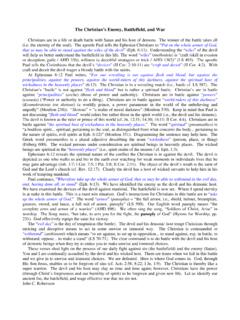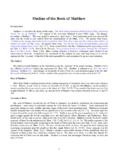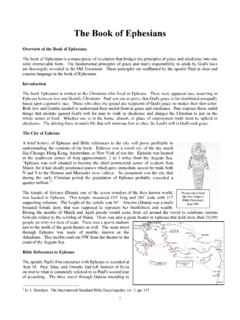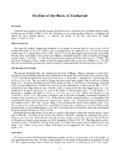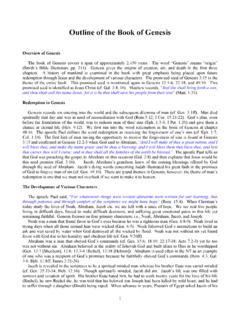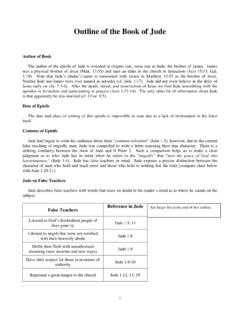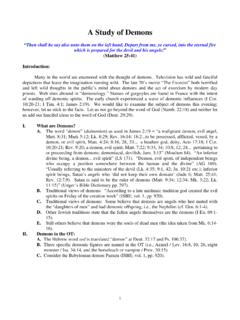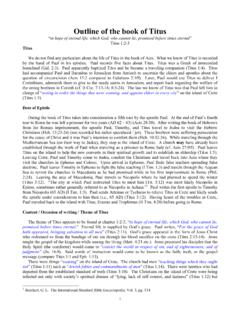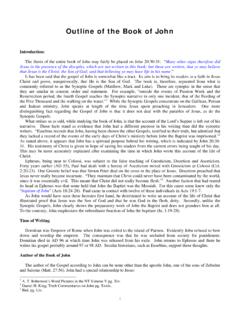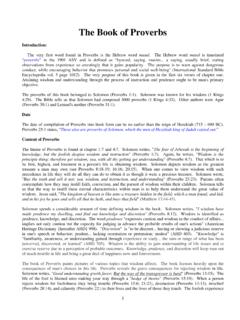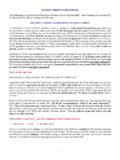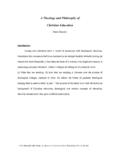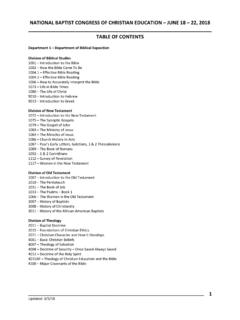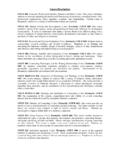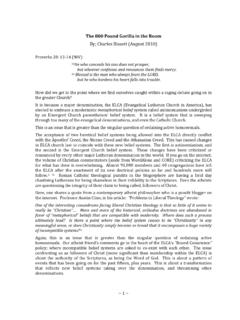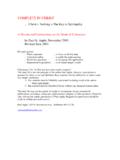Transcription of Outline of the Book of Philippians - Floral Heights …
1 1 Outline of the book of Philippians Getting Acquainted with Philippi in Bible History During the years 50 through 54 AD Paul embarks on his second apostolic tour. Paul and Silas travel through Galatia and meet Timothy in Lystra, circumcise him and take him along as a traveling companion (cf. Acts 16:1ff). Paul, Silas, and Timothy travel from Galatia to Troas in Asia Minor. Luke joins the three at this point and together the four travel through the Aegean Sea to Neapolis of Macedonia (Acts 16:10ff). Paul and his companions first come to the city of Philippi at approximately 51 AD. Paul s general practice was to find synagogues and begin his preaching to the Jews. Philippi; however, had no synagogue. Paul and his companions ask regarding the whereabouts of a Jewish place of worship. The information gained led them to a river outside of town where women met to pray (Acts 16:13). Lydia is converted after hearing the preaching of Paul and his companions at this gathering (Acts 16:14-15).
2 While in Philippi, Paul is annoyed with a girl who has a spirit of divination within her (Acts 16:16). The girl follows the four preachers day by day proclaiming that they had words of salvation. Paul eventually commands the spirit to come out of the girl and immediately it did. The girl s masters are incensed over the matter because they used the spirit s powers to make money. Paul and Silas are captured, imprisoned, beaten with rods and put in stocks. The accusation against Paul and Silas was that they were preaching a message contrary to the Roman civil laws (cf. Acts 16:21). While in prison, Paul and Silas were singing songs of praise to God when suddenly a miraculous earthquake trembles loosening all the prisoner s chains. The jailor in charge decides to kill himself due to the fact that he was responsible for all prisoners at the penalty of death if any escaped. Paul stops the jailor, preaches the gospel to him, and he is converted (Acts 16:30ff).
3 Acts mentions only the conversion of Lydia and the jailor; however, a faithful church was established (cf. Phil. 1:1). The Philippian brethren came to be instrumental in the spreading of the gospel of Jesus Christ through their monetary support of the apostle Paul. Paul states, And ye yourselves also know, ye Philippians , that in the beginning of the gospel, when I departed from Macedonia, no church had fellowship with me in the matter of giving and receiving but ye only (Phil. 4:15). The City of Philippi Philippi received its name from Philip II of Macedon, the father of Alexander the Great. The city was originally named Krenides and occupied by the people of the island of Thasos (a small island in the Aegean Sea just south of Neapolis). The city s history lies in the large amounts of gold that was discovered at a nearby mountain ( , Mt. Pangaeum). Philip II conquered the people of Thasos, took the city of Krenides, and renamed it Philippi.
4 During the year 168 BC, Philippi was conquered by the Romans at the battle of Pydna. All of Macedonia was overtaken by the Romans and divided into four sections. Philippi was a city in the first of these four districts whose capital was Amphipolis. Philippi attained the status of Roman colony (exempt from Roman taxes) at the year 31 BC. The city remained in this state during the days of Paul s visit (Map source = The ISBE; Vol. 3, pp. 834). Time and Place of Writing Philippians 1:7 states that Paul is in bonds. At Philippians 4:22 Paul states, All the saints salute you, especially they 2that are of Caesar s household. These two statements clearly point to Paul s two year imprisonment in Rome (AD 61 63). Due to Paul stating but I trust in the Lord that I myself also shall come shortly (Phil. 2:24) we can estimate that Paul was in the last stage of his Roman imprisonment and fully expected to be released (~ 63 AD).
5 Purpose of the Letter The highest priority in every Christian s life should be to make it to heaven. A study of the book of Philippians will leave one with a sharper vision of this objective. Thematically, Paul states, for our citizenship is in heaven; whence also we wait for a Savior, the Lord Jesus Christ: (Phil. 3:20). Heaven will be a place comprised of people who lived life with a spiritual purpose. The mind or thinking of a heavenward bound Christian is prescribed in the book of Philippians . Three major themes in Philippians expose the mind that sincerely looks to heaven. The heavenward bound man or woman will think spiritually, fellowship spiritual instructions, and care for others spirituality. People bound for heaven will have a peculiar way of thinking. Said Christian considers others above self (Phil. 2:4). When the heavenward bound Christian is treated shamefully by others, he does not seek vengeance. Said individual does not wear emotions on his sleeves to the point that he is offended by every look and statement of a spouse, brethren, and even those of the world (Phil.)
6 2:14; 4:12). He does not hope and trust in his earthly achievements (Phil. 3:3-9). When desperate times come, he does not fall into disparity (Phil. 4:11-13). When heaven is my true objective in life, I learn (Phil. 4:11-12) to be somewhat detached from the cares of this world. During Paul s day it seemed to be some people s objective to cause him pain, yet this did not bother him because heaven was his focus (cf. Phil. 1:12, 17-21, 30; 3:11-13, 20-21; 3:15; 4:12). Whether Paul was ill treated, hungry, or doing well in life, he was content knowing that he can do all things through him (Christ) that strengthens (4:13). When you and I learn to put away the cares of this world, our relationships with God, brethren, and our spouses will be much better. We will have a different outlook in life than the world. Our objective is ever to be heaven! (see study # 40; The Focused Life). Secondly, those whose objective is heaven will not only have a peculiar way of thinking, but they will fellowship (share in) spiritual things.
7 The book of Philippians reveals several aspects of Bible fellowship. Bible fellowship is to exist in the areas of preaching to the lost (Phil. 1:5), the grace of God (Phil. 1:7), defending and confirming truth (Phil. 1:7), the Spirit (Phil. 2:1) ( doctrinal unity) (Phil. 1:27; 2:2; 4:2), the suffering of Jesus (Phil. 3:10), sharing in each other s afflictions (Phil. 1:7, 4:14), and supporting gospel preachers (Phil. 4:15). Paul s hope was to gain Christ, and be found in him (Phil. 3:8-9). When I fellowship spiritual things, I gain Christ. I share in all aspects of the life of Christ when I put Him on (cf. Col. 3:12-15). The book of Philippians has indicated that various doctrines had threatened the unity of the Philippian church (cf. Phil. 1:9-11, 27, 2:2-3) and that those who stood opposed to these false teachers were being persecuted (Phil. 1:29; 3:10). Paul thereby warns the faithful not to be deluded by said teachers. Lastly, those whose objective is heaven will desire to see others make it to heaven.
8 Heavenward bound people will think more highly of others than self (Phil. 2:3-4), pray (Phil. 1:9-11, 19), long for (Phil. 1:8), be thankful for (Phil. 1:3), warn (Phil. 3:2, 18-19), encourage faithfulness in (Phil. 1:10, 27; 2:12), and share in each other s afflictions (Phil. 1:7, 4:14), and be willing to support the preaching of the gospel (Phil. 2:30, 4:10, 18). Note that in each of the above three themes of Philippians , the only individuality that the Christian has is a desire to make it to heaven. Paul says, Let us therefore, as many as are perfect, be thus (Phi. 3:15). Christ had no emotional, physical, or spiritual ties to earth other than being passionately concerned about the souls of men (cf. Phil. 2:6-8). Paul calls upon Christians to examine his life of contentment in Christ and so emulate it (Phil. 4:8-9). Today, we have godly men and women to look to for examples to follow (Phil. 3:17). When my mind is focused on heaven, those of the world, brethren, and friends may afflict me with rods or words of disparagement, yet will I press towards heaven.
9 When my health fails and I experience agonizing pain, I will continue to press toward heaven. I may have money, friends, and good health galore, yet I will continue to press towards heaven. Let us remember that this world is not our home, we are just a passing One s life goal of heaven should ever be the one thing I do (Phil. 3:13). The next time you get your feelings hurt, experience anger, jealousy, or have feelings of animosity toward someone, check your priorities and remember the book of Philippians . 3 Overview of Philippians : I. Paul s Prayer for the Philippians (1:1-12): A. A prayer of thanksgiving: 1. Paul gives thanks for the fellowship he shares with the Philippians in the area of spreading the gospel message. 2. Paul give thanks for the sharing he has with them in the area of bonds, defense, and confirmation of the gospel. B. Paul s prayerful request for the Philippians : 1. Paul prayed that the Philippians would grow in knowledge and discernment.
10 2. Paul prayed for the Philippians sincerity and purity of life. II. Paul calls upon the Philippians to live a life worthy of the gospel message (1:12-30): A. Paul rejoices in the fact that the gospel is preached: 1. Brethren were motivated by his bonds. 2. Some brethren preached of a pure and sincere disposition. 3. Some brethren preached a pure doctrine; however, their motives were sinful. B. Paul desires to be a part of the Philippians progress in the gospel. C. Paul calls upon the Philippians to walk worthy of the gospel of Christ. D. God has granted the Christian to both believe and suffer on behalf of Christ (1:29). III. Ten Attributes of the Mind of Christ (2:1-5): A. Paul reveals to the Philippians the way to emotionally handle the sufferings at hand ( , to have the mind of Christ). B. The mind of Christ is to think about others: 1. To encourage others who suffer (consider I Thess. 5:14). 2. Help others by making their suffering less burdensome or painful (consider II Cor.)
